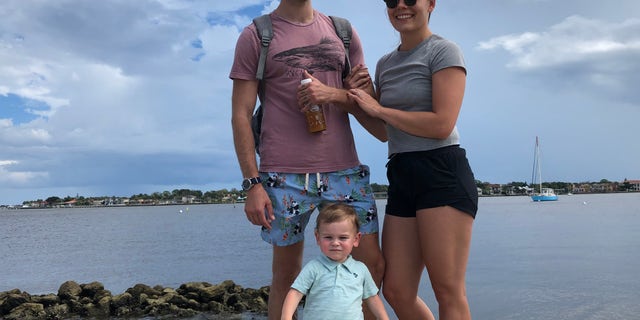A woman who lost her soulmate to a fentanyl overdose reflected on her struggle with grief during the holidays and offered advice to others who may be suffering from the loss of a loved one.
"Grief becomes heavier during the holidays," Gwen Dudley, a recovering addict, told Fox News. "Everything around you screams family, connection, tradition and love, so it amplifies the pain."
Dudley's partner, Paul Francs Duffy II, 32, relapsed after staying sober for three years. He died soon after, in May 2021, leaving behind him and Dudley's son, Luca, who is now three years old.
WOMAN FIGHTS STIGMA OF ADDICTION AFTER FENTANYL KILLED HER SOULMATE: WATCH HERE
WATCH MORE FOX NEWS DIGITAL ORIGINALS HERE
"My first holiday without Duffy was the most painful time of my entire life," said Dudley, who met Duffey while the two were in recovery. "All I could think about was the holidays we shared in the past and how much he was missing out on with our son."
"Every joyful moment with my son was a reminder that Duffy isn't here," she continued. "Decorating the tree felt like a dagger in the heart."
Duffy got hooked on the drugs through a legitimate prescription — he'd initially been given OxyContin in high school for a back injury, Dudley told Fox News. He battled with addiction for the next 15 years, going through multi-year periods of sobriety followed by relapse.
Two months after his final relapse, Duffy unknowingly bought drugs laced with fentanyl, a synthetic opioid 50-100 times stronger than morphine, according to the National Institute of Drug Abuse.
He never returned home.
LA COUNTY FENTANYL DEATHS SPIKE OVER 1000% IN FIVE YEARS
This Christmas, Dudley plans to honor Duffy's memory by making his favorite foods, adorning their tree with his childhood ornaments and decorating his grave with their son.
"A lot of people are afraid to talk to me about him out of fear of upsetting me, but it's actually the best thing I could ask for," she said.
"Always say his name," she added. "I want his memory to stay alive through us and also for the sake of my son."
Before his death, Duffy worked as a peer support specialist for the Anne Arundel County Health Department in Maryland, a position created as part of the county's effort to battle the fentanyl crisis.

Gwen Dudley said she plans on honoring her partner, who died of a fentanyl overdose, this holiday season by following through on their Christmas traditions with their three-year-old son.
(Courtesy of Gwen Dudley)
"That's the insanity of addiction, right?" Dudley told Fox News. "Duffy knew from his job how dangerous this was, but he thought he had it under control."
Dudley said fear of judgment, even from within the recovery community, held Duffy back from seeking help once he began using again in 2021.
Though she still grieves her partner, Duffy strives to bring meaning to his death by raising awareness about the dangers of fentanyl and ending the stigma around addiction so more people will feel comfortable seeking treatment.
"Losing a loved one to an overdose can be an isolating experience because of the stigma of addiction," she said. "People are afraid to tell others how their loved one died."
Dudley encouraged people to check on friends grieving the loss of a loved one due to drug abuse this holiday season.
LAW ENFORCEMENT AGENCIES ACROSS THE COUNTRY MADE SEVERAL RECORD-SETTING FENTANYL BUSTS IN 2022
"Maybe a year or two or five has passed since they lost someone and they seem okay on the outside," Dudley said. "But acknowledgment of their grief might be what they desperately need."
"Feeling alone is what takes people deeper into the despair of grief," she added. "But walking through it together will carry us through."

Dudley said grief is amplified during the holidays and encouraged people to check in on friends who are suffering a loss around this time of year.
(Courtesy of Gwen Dudley)
Now, Dudley works remotely as a national outreach coordinator for Ascend Recovery Center in West Palm Beach. She uses TikTok as a platform to raise awareness about the dangers of fentanyl.
"This is wiping out a generation," Dudley told Fox News. "Our children are dying."
"I hate to think about how many people will be spending their 2023 holiday without their spouse, child, brother, sister, mother, father and friend," she said.
CLICK HERE TO GET THE FOX NEWS APP
Drug overdose deathssurpassed 100,000 for the first time in US history in 2021, according to the CDC, Over 64,000 of those deaths were due to synthetic opioids like fentanyl,
"These deaths don't discriminate and so many people think it won't happen to them until it does," Dudley said.
"We are truly in the midst of a public health crisis that has no end in sight," she added. "If we want the deaths to slow down, the people at the top need to make it a priority in the same way that they did for COVID-19."
Originally published at Source Health


